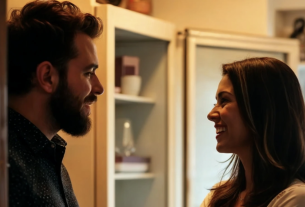“So? Where are you? Did you pick it up?” Kira’s voice was tense, stripped of its usual gentle notes. She sat in the kitchen, her head propped on her hand, staring at the dark screen of her old backup netbook. It could barely manage to open email, let alone the heavy graphics editors where all her work had frozen.
“Kir, almost home. I’ll be there in ten minutes,” Vlad answered cheerfully, the noise of the street in the background. “Come on, set the plates.”
“Vlad, I’m not talking about plates. Did you pick up the laptop? I have to submit the project by morning, you know that.”
A pause hung on the line, filled only with the distant hum of cars. To Kira, it felt like it lasted an eternity.
“Ah, the ’top… Yeah, of course. I’m flying home, don’t distract me. Kisses.”
Short beeps. Kira put down the phone and rubbed her temples. Her head was buzzing from hours of strain and liters of coffee. The project deadline wasn’t just flashing red—it was blazing with infernal flames, threatening to burn down the reputation she had built for years. Her powerful work laptop—her breadwinner and right hand—had treacherously died three days ago. And today, at the most crucial moment, it was supposed to be brought back to life. The service center was open until eight, Vlad finished at six. Two hours to spare. Perfect. She had deliberately refrained from pestering him with calls so as not to distract him on the road. She had trusted him.
Dinner was cooling on the stove. The smell of rosemary roast chicken, which an hour ago had seemed so cozy, now only irritated her.
She got up and paced the kitchen, feeling everything inside her tighten into a hard, nervous knot. Her entire existence now depended on one simple action—on whether he would bring that black bag with her resuscitated computer.
At last, the long-awaited click of the lock sounded in the hallway. Kira flew out of the kitchen, ready to shower her husband with kisses along with that chunk of life-saving metal. But she froze halfway. Vlad stood in the entryway, shrugging off his jacket. His hands were empty. Completely. No bag, not even a small packet. Only the car keys and his phone.
“Hi,” he smiled at her with his usual after-work, slightly tired smile, as if nothing had happened. As if she hadn’t been waiting for him like manna from heaven.
“Where?” was all Kira could exhale, her eyes sweeping over his empty hands.
Vlad sighed, lazy annoyance crossing his face. “Kir, you won’t believe it. The traffic jam was dead—we were barely crawling. I got there at eight-oh-five. Literally five minutes late. The guy was already lowering the shutter; I waved, shouted, but he pretended not to see and locked up. Said to come tomorrow morning.”
He said it so matter-of-factly, so calmly, as if telling her his favorite yogurt hadn’t been in stock at the store. He took off his shoes, went to the kitchen, and inhaled the aroma of dinner with pleasure. “Oh, chicken! Perfect, I’m starving.”
And Kira stayed standing in the hallway. She listened to his smooth, confident story and felt something inside her scratching. Something didn’t add up. An almost imperceptible false note in his serene tone. Five minutes late? Because of a traffic jam? He had left work at six, and the drive to the service center from there was forty minutes at most, even with congestion. What had he been doing for almost two hours?
She silently returned to the kitchen and sat at the table. Vlad was already bustling at the stove, serving himself the biggest piece.
“Why the long face? So it didn’t work out today, I’ll pick it up tomorrow morning. You’ll hand in your project during the day, no big deal. The bosses will understand.”
He didn’t understand. Or didn’t want to. To him it was just a piece of hardware. To her—it was a catastrophe. But she had neither the strength nor the desire to argue, prove, or shout now. A cold, viscous irritation began to slowly spread through her veins, squeezing out the panic and exhaustion. She watched him eat the chicken with appetite—the chicken she had cooked to thank him for his help. And at that moment, for the first time in a long time, she felt incredibly alone in their shared apartment.
The night passed in anxious, sticky silence. Kira couldn’t make herself go to bed. She sat at the old netbook, trying to squeeze the impossible out of it, but every command executed with such agonizing delay that it felt like torture. Vlad, full and content, fell asleep almost instantly, smacking his lips now and then in his sleep. His steady breathing lay like a background track over the ringing silence in Kira’s head, and it infuriated her even more. The feeling that something was wrong wouldn’t let go, digging into her subconscious like a splinter.
Morning brought no relief. It was gray and joyless. Kira woke to the sound of running water—Vlad had gone to the shower. She lay staring at the ceiling, replaying the previous evening. His calm. His overly smooth, rehearsed excuses. His complete indifference to her problem. And the more she thought, the more clearly she understood: he had lied. Brazenly, confidently, looking her straight in the eye.
Just then his phone on his bedside table vibrated and lit up. A neon flash of a social-network notification pierced the half-dark of the room. Kira hadn’t planned to touch it. She never did. But now, driven by a cold, angry curiosity, she reached out. On the lock screen hung the preview of a photo in which Vlad was tagged. The world shrank to the size of that small glowing rectangle.
In the photo, taken in a cozy café bathed in warm light, sat her husband. He was smiling broadly and genuinely happily, looking at someone across from him. And across from him sat Anya. His ex. The very one whose breakup he supposedly took as the greatest tragedy of his life. Vlad had a cup of cappuccino with fluffy foam in his hands, and a dessert stood on the table in front of him. But that wasn’t the main thing. The main thing was the geotag and the posting time, clearly visible under the photo: “Café ‘Cozy Courtyard,’” 19:34. Nineteen thirty-four. At that very time, according to him, he had been helplessly rattling the closed grate of the service center on the other side of the city.
The fury wasn’t hot and searing, as she’d imagined. It was icy, crystalline, giving everything around her an incredible, ringing clarity. In an instant the entire mosaic came together. His “traffic,” his “being late,” his patronizing “I’ll get it tomorrow.” It was all a lie. A brazen, unscrupulous lie, covering up a date with his ex. His wife’s request, her burning project, her career—all of that turned out to be less important than a cup of coffee and a pleasant chat with the past.
She set the phone back on the nightstand with the same precision with which a surgeon lays down a scalpel after an operation. No more analysis. No more doubts. Only a plan of action, born in her head instantly and definitively.
From behind the bathroom door came his carefree humming of some tune. He was in his warm, cozy world, wrapped in steam and self-satisfaction. Kira got up. Her movements became sharp, economical, and absolutely silent. She dressed quickly, grabbed her bag, the car keys, and left the apartment, quietly pulling the door closed behind her.
First stop—the service center. The young guy at the counter recognized her. “Oh, your husband stopped by yesterday, but we were already closing. I shouted to him to come in the morning. Here, everything’s ready, that’ll be three thousand.” Kira silently handed over her card. She didn’t even bother to clarify what time he had “stopped by.” It no longer mattered.
Getting into the car and placing the rescued laptop on the passenger seat, she made two calls. The first—to a lock-replacement service. “Good afternoon. I need to urgently change the cylinder in the front-door lock. How much will it cost and how soon can a locksmith come? In an hour? Perfect. I’ll be waiting.”
The second call was harder. She found in her contacts a number she hadn’t dialed in many years. “Anya.”
“Hello?” came a surprised young woman’s voice.
“Anya, hi. This is Kira, Vlad’s wife,” she said, as calm and friendly as possible. “Sorry for the strange call. Listen, I just wanted to ask… did you see him yesterday? He came home kind of weird, says he was delayed on errands. I’m worried—maybe something happened?”
Silence hung on the line. Anya clearly hadn’t expected that approach.
“Oh, Kira, hi… Well, yes, we did meet…” she said uncertainly. “Didn’t he tell you? It turned out a bit awkward…”
The key wouldn’t turn. Vlad tried again, pressing a little harder. Nothing. The lock mechanism didn’t so much as twitch. He pulled the key out, examined it—as if the problem could be in that familiar piece of metal down to its last nick—and inserted it again. Useless. The door—his own door to his own apartment—wouldn’t give. Exhaling in irritation, he took out his phone.
“Kir, what’s up, did you bolt it from the inside? I can’t get into the apartment.”
In response—silence, broken only by a faint background hum. Kira sat in the kitchen. In front of her on the table were a cup of cooling tea and, finally, her working laptop. The locksmith had left half an hour ago, leaving behind a barely noticeable smell of machine oil and a new set of keys lying next to the cup. She took a small sip. The tea was bitter.
“I didn’t bolt it from the inside, Vlad.”
“Then what’s with the door? Is the lock jammed?” Impatience crept into his voice. He wanted to go home, to eat, to sprawl on the couch. “Try opening it from the inside.”
“It’s not jammed. I changed the lock,” her voice was even, devoid of any emotion, like an announcer reading the weather.
Bewildered silence reigned on the other end. He was clearly trying to process this information, but it wouldn’t fit into his picture of the world.
“What do you mean you changed it? Why? Are you out of your mind? Open up, come on, this isn’t the time for jokes.”
Kira slowly set the cup on the saucer. The sound of porcelain on porcelain seemed deafening. She looked at her new keys. The keys to her new life.
“I’m not joking.”
“Neither am I!”
“I asked you only to pick up my laptop from repair, and instead you were having coffee with your ex! So go live with her! You don’t live here anymore! That’s it!”
The last word she spoke quietly, but it hit him harder than if she had shouted. He froze. The air on the landing suddenly turned thick and heavy.
“Kir, what… what are you saying? What ex? What coffee? I told you, I was stuck in traffic, I was late! Anya just asked me to help her move some boxes, she’s got a bad back, there was no one else! I literally stopped by for fifteen minutes, purely out of decency!”
His lie was so fast, so desperate and clumsy. He spoke in fits and starts, choking on words, trying on the fly to build a flimsy wall of excuses. But Kira was already on the other side of that wall.
“Boxes, huh?” She smirked, but the laugh came out silent. “Strange. Because when I called Anya an hour ago, she told me a completely different story. She said you didn’t move any boxes. That you’ve been seeing each other behind my back for a month. That yesterday you sat in a café and discussed how you’d make a nice exit from me. She even apologized, can you imagine? Said she felt awkward.”
Each of her words was a nail she methodically, mercilessly hammered into the lid of his coffin of lies.
He fell silent. All his prepared phrases crumbled to dust. Now the phone carried only his heavy, ragged breathing.
“You… you called her?” he croaked at last. In that question was everything: shock, rage, the realization of total failure.
“Yes. I called. I needed to make sure I was throwing out of my life not just a man who preferred a cup of coffee to my request, but a full-fledged traitor. So thank you. You dispelled all my doubts.”
“You’re insane!” he screamed into the phone, his voice, amplified by the speaker, filling the kitchen. “Completely out of your mind! Snooping through my contacts, calling my… acquaintances! Running checks!”
He went on the attack—the last stage of a liar cornered. But his yelling no longer frightened or hurt. It was just noise. An irritating background.
“Come get your things,” she calmly cut off his hysteria.
“I’ll bust this door down to hell!” he roared. “You don’t know me yet!”
Kira silently pressed the red button on the screen, cutting his shout off mid-word. The apartment grew quiet. She finished her bitter tea. And then she heard a fist slam against the door. Once. Twice. Three times. Then came a continuous, furious pounding. But she wasn’t listening anymore. She stood up and went to the bedroom. It was time to finish cleaning.
The pounding on the door stopped. But silence didn’t come. The racket simply moved under the windows. Now he was shouting. His voice, distorted by distance and rage, battered the double-glazed panes, trying to break inside. It was no longer a man’s shout, but the howl of a wounded, cornered animal—a chaotic stream of threats, accusations, and insults. He howled that she would regret it, that she was crazy, that he had spent his whole life on her.
Kira listened, standing in the middle of the bedroom. That noise no longer concerned her. It was somewhere out there, outside, in another reality to which she no longer had any relation.
She went to the big built-in wardrobe and with effort slid aside the heavy mirrored door. His half. Neat stacks of jeans, shirts on hangers, a shelf with sweaters. All of it part of the shared, familiar picture that only yesterday had seemed unshakable.
Her movements were free of fuss. They had a strange, almost meditative steadiness, like a person performing a long-familiar necessary task. She took several large black trash bags from the top shelf—the kind people buy for construction waste. Opening the first, she walked to the shelf with his shirts. And began methodically, one by one, ripping them from the hangers and stuffing them into the bag. Expensive shirts, ironed by her own hand, crumpled and disappeared into the black polyethylene maw. Then went the jeans, T-shirts, underwear. She didn’t sort or separate. She simply scooped up everything that belonged to him, freeing the space.
The second bag filled with his shoes—running sneakers, heavy winter boots, dress shoes. Into the third went his electronics: the game console he loved more than anything in the world, a collection of controllers, headphones, chargers, an external drive with his movies and games.
She acted without hatred, with cold, detached diligence. She wasn’t destroying his things. She was just getting rid of them, like clutter that had occupied space in her home for far too long.
Vlad under the windows had already gone hoarse. His screams had become a hoarse mutter. Seeing the light on the balcony, he fell silent and raised his head. He must have decided she had finally caved. That now she would shout something back, maybe even toss down the keys. For a second, hope flickered in his posture.
Kira stepped out onto the balcony, dragging the first, heaviest bag of clothes behind her. The night air was cool and damp. She walked up to the railing. Vlad stood below, head thrown back, looking at her. Their eyes met for a split second across the five floors of empty space between them. Then she untied the knot and, turning the bag over, began to shake it out.
His life, his neatly folded habits, his style—all of it rained down. Shirts and T-shirts glided through the lamplight like birds shot down. Jeans fell in heavy, limp lumps. His entire wardrobe in an instant became garbage scattered across the lawn, the asphalt path, the hood of a neighbor’s car.
For a few seconds an absolute, ringing silence settled over the courtyard. Vlad stared at the surreal spectacle open-mouthed, unable to believe what was happening. And then he burst. It was no longer a shout, but a wail full of impotent, animal rage.
“You… What the hell are you doing, you bitch?! Are you insane?! I’ll kill you!”
But his words were only sound. Without paying them any attention, Kira went back inside, took the second bag, and returned. Down went his shoes, slapping the ground with dull, final thuds. Then it was the electronics’ turn. He watched in horror as his beloved console—his treasure—flew down and shattered with a dry crack against the asphalt.
She emptied all the bags. When the last of his belongings—some lone glove—left the balcony, she didn’t say anything. She just stood for another moment, looking down at the work of her hands. At the man crawling across the dirty lawn, frantically gathering what was left of his former life, muttering curses. Then she turned and went into the depths of her now empty and absolutely quiet apartment.
The sentence had been carried out.



